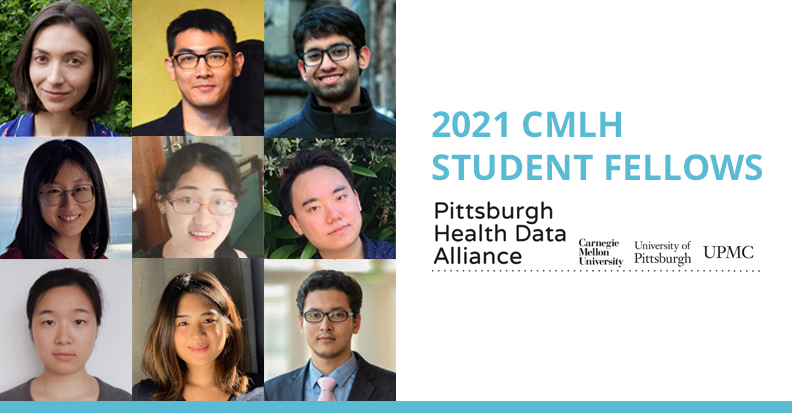CMLH Archive: 2021 Fellows

The 2021 CMLH fellows include (top, l-r) Samantha Horn, Humphrey Yang and Chaitanya Goswami; (center, l-r) Rui Sun, Jingjing Tang and Paul Liang; and (bottom, l-r) Sheng Zhang, Maria Jahja and Mononito Goswami.
Meet the 2021 Fellows
Samantha Horn is a Ph.D. candidate in the Department of Social and Decision Sciences (SDS) and a secondary master’s student in the Machine Learning Department. Her research focuses on preventative health decision making and developing behavioral interventions to enhance public health. She is particularly interested in how learning and attention contribute to health decisions and outcomes. Before joining CMU, she completed a bachelor’s degree in classics at King’s College London, a graduate diploma in economics from SOAS, and a master’s in international and development economics from Yale University.
Fellowship Research: Applying Behavioral Insights to Continuous Glucose Monitor (CGM) Feedback Using Adaptive Experimentation
Humphrey Yang is a Ph.D. Student in the Human-Computer Interaction Institute, advised by Assistant Professor Lining Yao. His research focuses on using smart materials to make sensing and actuatable devices, applying these materials to different application contexts, and adapting machine learning to model smart materials and develop interactive design tools. Prior to joining the HCII, Humphrey earned his bachelor’s degree in architecture from the National Cheng Kung University, Taiwan, and an M.Sc. degree in computational design from the School of Architecture at CMU.
Fellowship Research: Compliant Medical Exoskins for Physical Rehabilitation and Treatment
Chaitanya Goswami is a Ph.D. student in Electrical and Computer Engineering, advised by Professor Pulkit Grover, whose research primarily focuses on designing noninvasive neurostimulation therapies, with a particular focus on the design of novel electrical stimulation techniques. Currently, Chaitanya is developing data-driven approaches that can directly design electrical stimulation waveforms for selective stimulating different neuron types, which has potential applications in treatment of various neurological diseases, such as Parkinson's disease, stroke rehabilitation, and many more. Chaitanya earned a bachelor's in electrical engineering at the Indian Institute of Technology, Kanpur, with minors in artificial intelligence and linguistics.
Fellowship Research: Data-Driven Approach for Designing Electrical Waveforms for Selectively Stimulating Neurons
Rui Sun is a Ph.D. candidate in the Biomedical Engineering Department advised by Dr. Bin He. Her research focuses on electromagnetic source imaging from noninvasive brain measurements, mainly for epilepsy biomarkers. She holds an undergraduate degree in electrical engineering from Fudan University and a master’s degree in electrical and computer engineering from CMU.
Fellowship Research: Imaging Spatiotemporal Brain Sources From Noninvasive EEG for Aiding Epilepsy Treatment Planning
Jingjing Tang is a Ph.D. candidate in the Computational Biology Department, advised by Roni Rosenfeld. Jingjing received a master’s degree in health data science from Harvard's T.H. Chan School of Public Health and a bachelor’s degree in statistics from Nanjing University. Her research focuses on developing and applying machine learning and statistical methods to epidemiological forecasting and modeling.
Fellowship Research: The Impact of Social Determinant of Health on the Modeling of COVID-19.
Paul Liang is a Ph.D. student in the Machine Learning Department, advised by Louis-Philippe Morency and Ruslan Salakhutdinov. His research aims to build socially intelligent embodied agents with the ability to perceive and engage in multimodal human interaction. As steps toward this goal, he focuses on the fundamentals of multimodal learning, specifically the representation, translation, fusion and alignment of heterogeneous data sources, as well as human-centric applications in language, vision, speech and healthcare. Previously, he received a master's degree in machine learning and a bachelor's degree with university honors in computer science from CMU.
Fellowship Research: Privacy-Preserving Technologies for Personalized Mood Prediction From Mobile Data
Sheng Zhang is a Ph.D. student in the Biomedical Engineering Department, advised by Professor Siyang Zheng. Her research focuses on developing liquid biopsy based diagnostic tools for cancer. She received a master's degree in biomedical engineering from CMU and a bachelor's degree in computer science from the Chinese University of Hong Kong.
Fellowship Research: Early Pancreatic Cancer Detection Using Extracellular Vesicle DNA Methylation Signatures in Blood.
Maria Jahja is a Ph.D. candidate jointly in the Department of Statistics & Data Science and the Machine Learning Department, where she is advised by Associate Professor Ryan Tibshirani. Her research focuses on statistical frameworks for online nowcasting, particularly in settings where the target signal is latent or partially observed. Prior to joining CMU, Maria earned bachelor's degrees in statistics and economics from North Carolina State University, where she studied uncertainty measures in precision medicine and sequential decision-support for personalized treatment.
Fellowship Research: Sensor Fusion With Digital Data for Epidemiological Nowcasting
Mononito Goswami is a Ph.D. student at the Auton Lab in Robotics Institute, advised by Professor Artur Dubrawski. His research focuses on leveraging weak supervision and domain knowledge from experts to affordably annotate large datasets. His current research goal is to use these techniques to prognose neurological recovery of patients in coma following a cardiac arrest event to enable better critical care and clinical resource management. Prior to pursuing his Ph.D., he earned his bachelor's in computer engineering from Delhi Technological University in India.
Fellowship Research: Affordable Machine Learning for Neurological Prognostication

